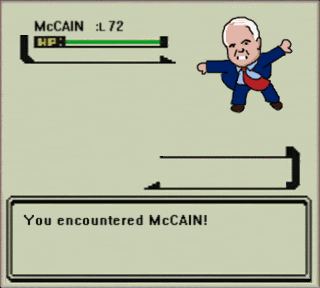The candidacy of Howard Dean in 2004 was in many ways a shot, by the new generation of Democrats, across the bow of the old Democratic party leadership, stuck in the politics of the past, and of the red state-blue state mentality, and too tied to the corrupt DC establishment. This new generation believed in creating a Democratic party that was competitive in all 50 states, that rejected corporate/lobbyist money by relying on an army of small donors, and who generally used a bottom-up, grassroots strategy to campaigning. The failure of the Dean campaign (perhaps not ready for prime-time) was a setback, but regained credibility after the chosen candidate (Sen. Kerry) failed in the general election. Dean was then selected-- despite the protests of many party elders-- as DNC chairman, and he began putting his 50-state strategy into practice. In 2006, that strategy payed off.
Now it's 2008 and our two remaining Democratic presidential candidates represent the two sides of this debate. First, you have Sen. Clinton, representing the old guard (old by 2008 standards meaning 1992) approaching the election in the traditional manner (lots of TV ads, focusing on a few big states). And then there is Sen. Obama, whose quiet building
of a grassroots army in every corner of the country over the past year has him on the verge of defeating his party's biggest dynasty. So many of the stories of this campaign-- from Obama's success in caucus states to Hillary's dismissal of 'unimportant' states and stuff like the 3am ad-- can be seen through this prism. In many ways, this campaign is so heated because it is a proxy battle between the old and new generation of Democrats.
Here's
another story that really illustrates that point-
[I]nfluential fund-raisers for Senator Hillary Rodham Clinton have stepped up their behind-the-scenes pressure on national party leaders to resolve the matter, with some even threatening to withhold their donations to the Democratic National Committee unless it seats the delegates from the two states or holds new primaries there...
...Pushing to seat the Florida delegates, at least one top Clinton fund-raiser, Paul Cejas, a Miami businessman who has given the Democratic National Committee $63,500 since 2003, has demanded Democratic officials return his 2007 contribution of $28,500, which they have agreed to do...
Considering Sen. Obama has shown an ability to raise over
$50 million in one month, I think the DNC can afford to lose a few people in a primary attempting to
blackmail them to bend to Clinton's demands... particularly when those people will likely return all apologetic come general election season anyway.
And what Sen. Clinton seems to not realize is that these actions will only increase the odds of her downfall, rather than vice versa. Dean has been going out of his way for weeks to attempt a solution to the Florida/Michigan debacle, but the more the Clintons throw grease onto the fire, the more likely he will be to leave the delegates unseated, as all candidates had originally agreed to. Moreover, her actions are now causing more and more party leaders-- from
Speaker Pelosi to
delegates left and right-- to drop their neutrality to speak out against her actions.
This is nothing new, of course. Right after the 2006, James Carville and other party hacks
suggested replacing Howard Dean as chairman... you know, after he had delivered to them both houses of Congress. What a horrible leader! And the guy that they wanted to replace him with was Harold Ford, aka the only Senate candidate that year to lose a seat to the Republicans (and who was last seen
endorsing Republican congressional candidates). An illustrative example.
I live not only only in a blue state, but in the bluest city in that state. So it's not that it affects me personally, or at all, which path Democrats choose in this battle. I do, however, believe that a party that chooses to continue seeing itself as the niche party of just a few 'important' states rather than a national party which can sell its ideas to every corner of the nation is writing its own death warrant. I am an unabashed liberal (or progressive, or whatever other name we have) and I want those ideas to succeed. I am supporting the candidate who best represents the type of party I believe can achieve that end.
I respect there's another side to this debate, but being a
progressive means the desire to move forward, not look back.


